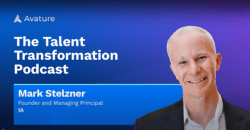Newsletters

FROM MARK
There’s nothing quite like graduation season. Caps and gowns are out again. Pomp and Circumstance is playing across campuses nationwide. Proud parents are booking hotels and restaurants. But behind the smiles and celebrations, this year’s college graduates are facing some seriously tough realities, one of which is the startling realization that many will likely be facing a 60-year work life.
Although the Wall Street Journal covered this in a three-part series in 2023, it was a recent post by Dr. Joe Coughlin, Director of MIT’s infamous AgeLab, that brought this topic in sharp relief. I had the pleasure of meeting Joe several years ago, and I find his work and that of his colleagues to be critical to our understanding of longevity, caregiving, wellbeing, and the new tools and technologies that will aid us in our latter years.
When a T-Rex gave my high school commencement speech during the Jurassic Period, the question most of us were asked was, “What do you want to be?” The notion (that many of us recall) was that you picked a singular area of focus, went to college or a trade school, and that was it. Your job. Your identity. Your life. Of course, as the kid who chose aerospace engineering during a time when jobs in that field declined more than 40%, you all know that’s not how my story ended.
Joe’s piece rightfully reminds us that this is, “… a rotary phone question in a mobile phone world.” In the era of longevity, we must plan for multiple lives, and that requires us to think in decades, not just years. Joe suggests three questions that fundamentally shift the mindset and expectations for today’s graduates:
- What problems do you love solving? “Longevity thinking reminds us that skills fade, industries change, and job titles disappear—but passion, interest, or innate skill endures.”
- How will you keep learning throughout your life? “We’re living in the most dynamic learning environment in history. Keep learning or be left behind. The question isn’t whether you will keep learning—it’s how you will keep learning.”
- How do you want to invest your time? “Longevity thinking approaches time like a portfolio, balancing conservative choices (family, health, core skills) with bold moves (passion projects, sabbaticals, new careers at 50). Some investments yield slow, steady returns, while others deliver unexpected dividends years later.”
So here’s to the Class of 2025. Lottery winners aside, the notion of working until 2085 (or beyond) certainly feels a bit daunting, but the upside is that it is never too late to reinvent yourself.
Release the pressure valve of having all of that figured out now, and instead just pick a place to start with the absolute knowledge that the world is vast, the journey often circuitous, and that most of us still are trying to figure out what we want to be when we grow up.

Founder/Managing Principal/Graduate Cheerleader, IA
THE LATEST

Sick of the word ‘pivot’ yet?
April 1, 2025
by Mark Stelzner
Read More >

The Talent Transformation Podcast
March 26, 2025
with Mark Stelzner
Listen Here >
OF INTEREST

Organizations turn to AI for traditional roles.
Read More >

Remote work makes you happier? You don’t say.
Read More >

To change behavior, go EAST.
Read More >

Car makers are finally accepting that buttons might be better.
Read More >
consultant-proof your business.
Strange thing for a firm like IA to say, we know. But we truly believe that the best thing you can do for your business is start making changes and plans NOW to avoid the need for a larger transformation down the road. And yes…a consultant can help you do this, but we should be there for support and guidance, not park our butts there. That’s why we don’t like consultants either. We are advisors – we want to help you reach your true potential and goals.





